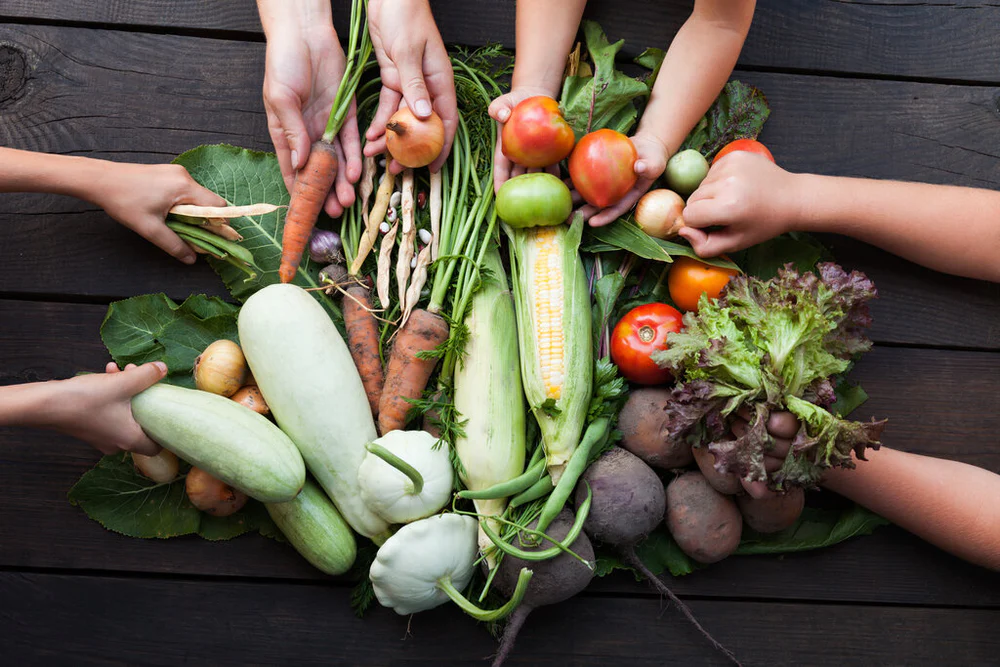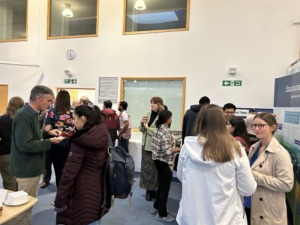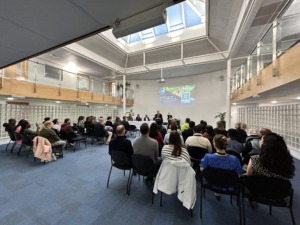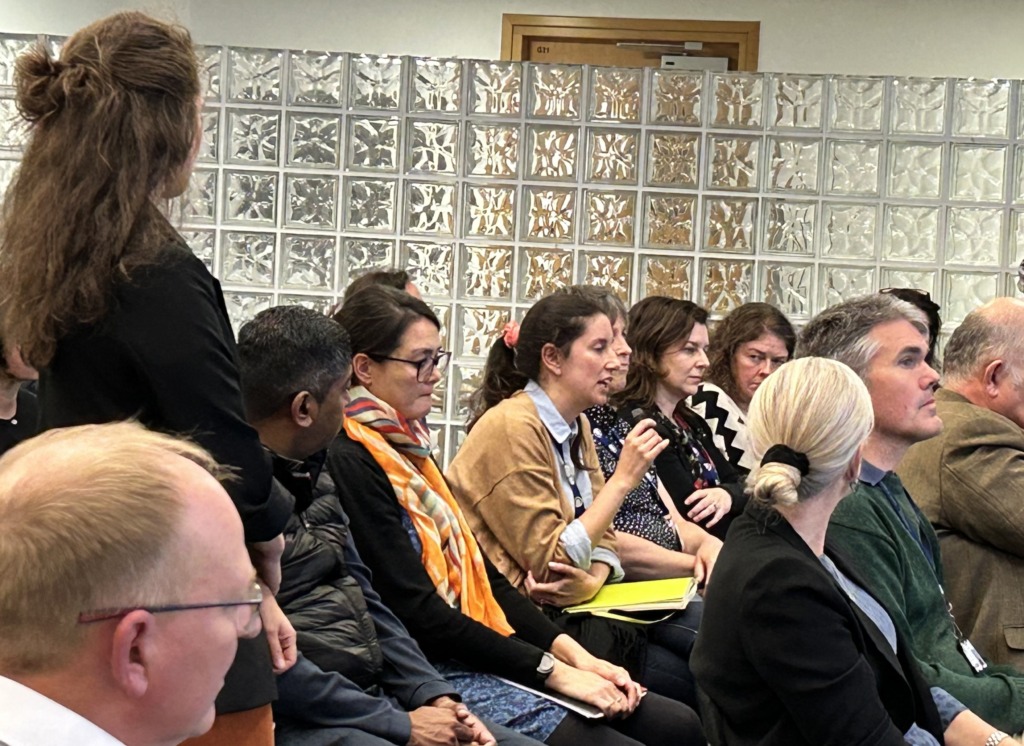“The Transformational Power of Food”: Discussing Our Two Favourite Topics – Food & Sustainability
08/11/2023

The recent panel discussion organised by Cranfield University’s Sustainability Network unearthed an exploration into how sustainability and net zero is driving innovation in the food sector. Attended by a diverse audience, including students, faculty, local business people, and food industry professionals from outside the university, the event provided a unique platform for an inclusive and comprehensive dialogue.
My favourite part of the night was when we got to speak with the panel speakers outside of the session, introducing ourselves and passionately discussing our shared enthusiasm for sustainability. Over drinks and snacks in an informal networking setting, the connections we fostered underscored the power of collaboration and the collective drive for a greener future.
Interdisciplinary Learning and Food Systems Thinking
Rosina Borelli, a passionate Ph.D. student and an advocate for holistic education in sustainable food systems, brought forth a compelling argument for the necessity of interdisciplinary learning. Her passionate dedication to instilling food systems thinking among students emphasised the critical role of comprehensive education in shaping a sustainable future.
Paul Burgess, a seasoned professor of Sustainable Agriculture, delivered a heartfelt call to action, shedding light on the need for collaborative efforts and diverse skill sets required to profitably achieve net-zero goals in the food sector. His profound insights not only highlighted the challenges but also illuminated the immense possibilities within the realms of sustainable agriculture.
Taste and Sustenance
Zbigniew Lewicki, with his global experience in the food industry across purpose-led brands such as Unilever, Lipton, Knorr and Magnum, captivated the audience with his emphasis on the intricate connection between delectable food and sustainable practices. He mentioned a key learning from experience bringing together the art and science of cooking: “the only way to change anything in the food system is to offer delicious food.”
As he unveiled the art of balancing culinary delight with environmental consciousness, he underscored the transformative potential embedded within various sub-sectors. Here are two aspects that stood out for me:
Circular economy: The food and agriculture industry currently emits approximately 13 billion tons of carbon. With the potential of achieving net-zero soon, around 700 to 800 billion tons of carbon economy could be redirected, prompting us to explore new valuable economic avenues.
AI in the food sector: While the global food industry generates $9.4 trillion annually, the health & pharma sector, with $8.3 trillion, receives nearly nine times more AI capital investment compared to agriculture, indicating significant untapped potential for AI-driven advancements in the food industry.
Importance of Farm-Level Data in Food Transformation
Oliver Rubinstein, through his insightful discourse on data innovation at the farm level, unravelled the complexities surrounding accurate carbon emission data. His introduction of Sandy, a revolutionary software solution designed to bridge the gap between emissions reporting and actionable sustainable practices, ignited a sense of hope and empowerment among the audience.
The discussions resonated with the audience, highlighting the paramount significance of embracing comprehensive natural capital accounting. The emphasis on accessible tools and user-friendly software underscored the critical role of technology in empowering farmers and facilitating the widespread adoption of sustainable practices within the food industry.
In the wake of the event, a collective realisation dawned upon the attendees, emphasising the intrinsic harmony between sustainability and taste. As the discussions drew to a close, the resounding message of shared responsibility echoed through the hall, leaving an indelible mark on each participant, igniting a collective commitment to shaping a sustainable and delectable future for the food industry.
Engagement With the Speakers
The session culminated with a Q&A session, where students and external visitors passionately posed thought-provoking questions to the esteemed panel of experts. The interactive exchange not only deepened the understanding of the intricate issues at hand but also fostered a sense of collaboration and shared responsibility among all participants, further fuelling the drive for sustainable practices and innovation within the food industry.
Lastly, I’d like to extend my heartfelt gratitude to Cranfield University for orchestrating this insightful event and fostering a community-driven dialogue, helping us correlate our class learning with industrial practices.
See the full recording of the event here
Learn more about our upcoming Sustainability events
Categories & Tags:
Leave a comment on this post:
You might also like…
Keren Tuv: My Cranfield experience studying Renewable Energy
Hello, my name is Keren, I am from London, UK, and I am studying Renewable Energy MSc. My journey to discovering Cranfield University began when I first decided to return to academia to pursue ...
3D Metal Manufacturing in space: A look into the future
David Rico Sierra, Research Fellow in Additive Manufacturing, was recently involved in an exciting project to manufacture parts using 3D printers in space. Here he reflects on his time working with Airbus in Toulouse… ...
A Legacy of Courage: From India to Britain, Three Generations Find Their Home
My story begins with my grandfather, who plucked up the courage to travel aboard at the age of 22 and start a new life in the UK. I don’t think he would have thought that ...
Cranfield to JLR: mastering mechatronics for a dream career
My name is Jerin Tom, and in 2023 I graduated from Cranfield with an MSc in Automotive Mechatronics. Originally from India, I've always been fascinated by the world of automobiles. Why Cranfield and the ...
Bringing the vision of advanced air mobility closer to reality
Experts at Cranfield University led by Professor Antonios Tsourdos, Head of the Autonomous and Cyber-Physical Systems Centre, are part of the Air Mobility Ecosystem Consortium (AMEC), which aims to demonstrate the commercial and operational ...
Using grey literature in your research: A short guide
As you research and write your thesis, you might come across, or be looking for, ‘grey literature’. This is quite simply material that is either unpublished, or published but not in a commercial form. Types ...









